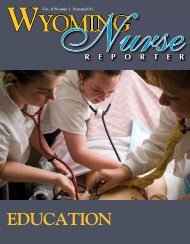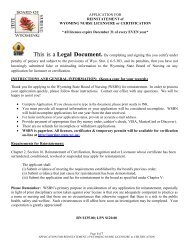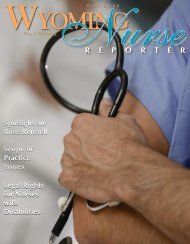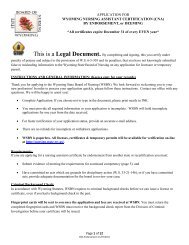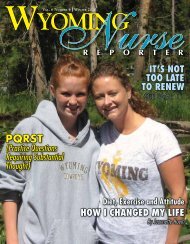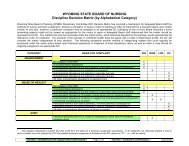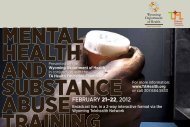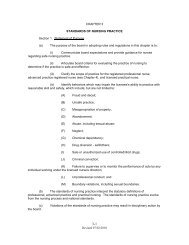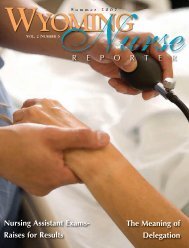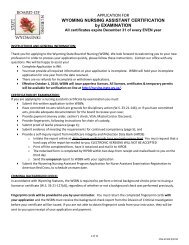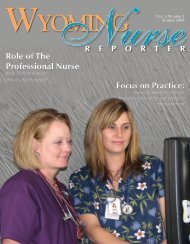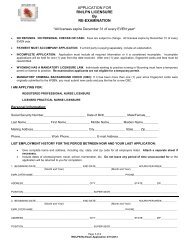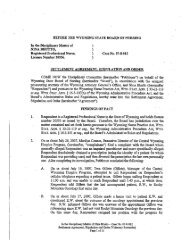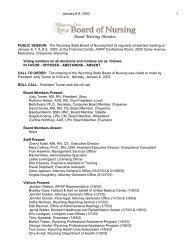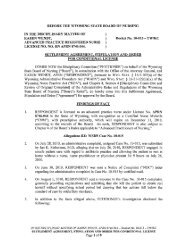Nurse Reporter Winter 2007 - Wyoming State Board of Nursing
Nurse Reporter Winter 2007 - Wyoming State Board of Nursing
Nurse Reporter Winter 2007 - Wyoming State Board of Nursing
You also want an ePaper? Increase the reach of your titles
YUMPU automatically turns print PDFs into web optimized ePapers that Google loves.
must investigate the complaint and<br />
decide whether or not the nurse can<br />
continue to practice in that state.<br />
In addition, <strong>Wyoming</strong>, where the<br />
nurse is licensed, is required to<br />
investigate the complaint and<br />
decide whether or not the nurse can<br />
continue to be licensed. This means<br />
that two states are investigating<br />
incidents across state lines and the<br />
cost <strong>of</strong> discipline is doubled.<br />
In order to investigate the disciplinary<br />
cases, states are required to<br />
share information. However, even<br />
though NLC is based on trust, flexibility,<br />
communication, and collaboration,<br />
the sharing <strong>of</strong> information is<br />
also based on state laws. <strong>State</strong> laws<br />
governing the sharing <strong>of</strong> information<br />
regarding disciplinary actions<br />
are not consistent. Because NLC<br />
allows increased mobility <strong>of</strong> nurses,<br />
the ability to evade discipline exists,<br />
and states have difficulty tracking<br />
the nurses.<br />
Educational preparation and standards<br />
related to licensure are also<br />
concerns <strong>of</strong> the <strong>Board</strong> <strong>of</strong> <strong>Nursing</strong>.<br />
The NLC means that the lowest<br />
common denominator <strong>of</strong> standards<br />
would exist. <strong>Wyoming</strong> must unconditionally<br />
accept nurses’ licenses<br />
from other states regardless <strong>of</strong><br />
whether those states require equally<br />
rigorous licensure standards.<br />
An issue the healthcare agencies in<br />
<strong>Wyoming</strong> may need to be concerned<br />
about is the possible depletion <strong>of</strong> the<br />
nursing pool in <strong>Wyoming</strong>. <strong>Nurse</strong>s<br />
would be able to live in <strong>Wyoming</strong> but<br />
work in adjoining states that pay<br />
higher wages and have lower licensure<br />
fees resulting in a migration <strong>of</strong><br />
nurses to bordering states.<br />
The final concern <strong>of</strong> the WSBN<br />
is the loss <strong>of</strong> revenue to the <strong>Board</strong>.<br />
The loss is based on verification <strong>of</strong><br />
licensure, endorsement fees, and<br />
renewal fees. There is also an<br />
increased cost associated with the<br />
NLCA and maintenance <strong>of</strong><br />
NURSYS, the database system all<br />
states are required to use.<br />
Additional costs include the need<br />
for staff who must be employed to<br />
oversee the implementation <strong>of</strong> the<br />
NLC and assist with the increased<br />
disciplinary workload. The only way<br />
for the <strong>Board</strong> to recoup these costs is<br />
to increase licensure fees for the<br />
nurses in <strong>Wyoming</strong>.<br />
■ What benefits are associated<br />
with the NLC: It is common<br />
knowledge that nurses now extend<br />
their practices across state lines due<br />
to electronic medicine, consolidated<br />
health care agencies, and managed<br />
care. All licensed nurses would<br />
have increased mobility between<br />
states, so traveling nurses would be<br />
free to move about. There could be<br />
an increase in the nursing workforce,<br />
as nurses would be able to<br />
practice in a state without licensure<br />
barriers. <strong>Nurse</strong>s would be readily<br />
available to assist during times <strong>of</strong><br />
disaster. Telenursing could be utilized<br />
across state lines via telephone,<br />
videoconferencing, etc. <strong>Nurse</strong>s<br />
could receive rapid licensure verification<br />
because NURSYS provides<br />
online access.<br />
■ How to achieve success <strong>of</strong><br />
NLC: The concept <strong>of</strong> the NLC has<br />
been discussed since 1996. It <strong>of</strong>ficially<br />
began in January, 2000, when<br />
five states passed it into law. The<br />
<strong>Board</strong> has been working towards the<br />
goal <strong>of</strong> Compact implementation<br />
over the past couple <strong>of</strong> years.<br />
However, this would be a new system<br />
<strong>of</strong> licensure in <strong>Wyoming</strong> if<br />
adopted by the legislature in the<br />
future. The key to success in<br />
<strong>Wyoming</strong> is communication, collaboration,<br />
information sharing, education,<br />
technical assistance, and standardization.<br />
All those involved need<br />
to be made aware <strong>of</strong> the benefits and<br />
the problems.<br />
■ Summary: The <strong>Nurse</strong> Licensure<br />
Compact is a state nursing license<br />
recognized nationally and enforced<br />
locally. You, the nurse, would have<br />
a license in your home state, in this<br />
case, <strong>Wyoming</strong>, but would be able to<br />
practice in other states within the<br />
Compact. In order for this to happen,<br />
the <strong>Wyoming</strong> Legislature must<br />
pass a statute allowing <strong>Wyoming</strong> to<br />
enter into the <strong>Nurse</strong> Licensure<br />
Compact. The <strong>Wyoming</strong> <strong>State</strong><br />
<strong>Board</strong> <strong>of</strong> <strong>Nursing</strong> would then adopt<br />
Rules and Regulations, implementing<br />
the agreement between the compact<br />
states. You need to be aware<br />
that there are benefits to nurses, the<br />
public, health care institutions, and<br />
governing bodies. You also need to<br />
know the concerns and problems<br />
associated with a NLC such as<br />
depletion <strong>of</strong> the nursing pool, revenue<br />
loss to the WSBN, increased<br />
costs in maintaining the NLC, discipline<br />
issues, and timely sharing <strong>of</strong><br />
information between states.<br />
The information for this article came<br />
from the <strong>Wyoming</strong> <strong>State</strong> <strong>Board</strong> <strong>of</strong><br />
<strong>Nursing</strong>, a memorandum written by<br />
Cheryl Koski, Executive Director,<br />
<strong>Wyoming</strong> <strong>State</strong> <strong>Board</strong> <strong>of</strong> <strong>Nursing</strong>, to<br />
the Honorable Governor Dave<br />
Freudenthal, August, 2006; Slides <strong>of</strong> the<br />
<strong>Wyoming</strong> <strong>State</strong> <strong>Board</strong> <strong>of</strong> <strong>Nursing</strong>; the<br />
<strong>Nurse</strong> Licensure Compact<br />
Administrators, Final Version,<br />
November 6, 1998, and the National<br />
Council <strong>of</strong> <strong>State</strong> <strong>Board</strong>s <strong>of</strong> <strong>Nursing</strong>.<br />
W Y O M I N G N U R S E R E P O R T E R 7



